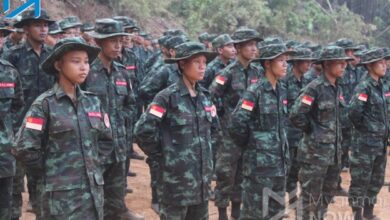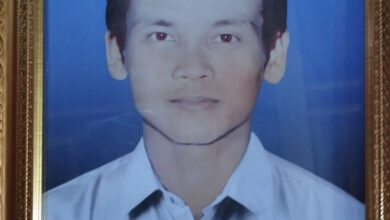
Hundreds of civil society organisations and student and labour unions have called on TotalEnergies to stop providing revenues to the military junta from the Yadana gas project.
An open letter signed by 789 organisations called on the French oil giant to channel its gas revenues into a protected account so that the regime cannot access the funds.
TotalEnergies has said that the junta will no longer receive a share of profits from its pipeline to Thailand, but that only represents a small part of Myanmar’s earnings from gas.
Gas revenues provide the coup regime with an estimated US$1b per year in vital hard currency which it needs to pay for imports such as weapons and fuel.
“All the spending needs in terms of foreign exchange are met from mining and oil and gas revenues,” a former adviser to Myanmar’s finance ministry told Myanmar Now. “The military as an institution could finance itself indefinitely.”
Economists say that blocking the flow of gas revenues, as well as stopping the generals from accessing Myanmar’s several billion dollars in foreign reserves, would have a significant financial effect on the junta.
It is impossible to know, however, whether this would force the generals to the negotiating table or cause them to become even more uncompromising.
“My best guess is that these forms of sanctions would cause significant problems for them and impact their ability to purchase all of the weapons, ammunition and fuel that they need,” said a member of Independent Economists for Myanmar (IEM), a group of experts which is strongly critical of the regime.


The IEM economist added: “However, I think that effective sanctions on foreign reserves and gas revenues would not by themselves instantly topple the regime.”
The World Bank estimated in July that the military coup and Covid-19 would shrink Myanmar’s economy by nearly a third, which would more than double the number of people in poverty—a figure estimated to be nearly 25 percent by the Asia Development Bank in 2017.
The junta has admitted that its finances have been impacted by the pandemic and what its minister for investment and foreign economic relations, Aung Naing Oo, described to Reuters as “sabotage and civil disobedience.”
The minister said in October that Myanmar’s vital reserves of foreign currency, which the regime uses to finance foreign trade, were now $6.04b.
This compares to a World Bank figure of $7.8b at the end of 2020, according to Reuters. This suggests that the junta may have spent a large part of the foreign reserves which are thought to be held in banks outside Myanmar.
Another $1b of the foreign reserves has been frozen in the US, leaving up to $5b still accessible to the regime, economists say.
Junta investment minister Aung Naing Oo also said that Myanmar was now collecting tax revenues equal to only five to six percent of its Gross Domestic Product (GDP) compared to 8.4 percent in 2020.
These figures suggest that collection of domestic taxes in Myanmar, which has historically been weaker than in many neighbouring countries, has fallen still further since the coup.
The military council is also thought to earn several hundred million dollars per year from mining exports.
The financial position of the junta is impossible to determine with certainty because it does not publish such data. It does have other options for raising foreign currency, though not on the scale of the foreign reserves or the gas revenues.

For example, the generals could try to raise more money by smuggling gems or compelling private traders to hand over more of their foreign earnings, the experts said. Or the junta could try to sell assets or borrow from sympathetic foreign countries, such as Russia.
“If they need spare parts, they will find a way to pay for them,” said a foreign political risk analyst with significant experience working on Myanmar. “The more cornered they are, the more ruthless they will be in finding ways to get their hands on money.”
Within Myanmar, the regime can meet some of its domestic needs—such as paying civil servants’ wages—by simply printing more kyat. It can also continue to cut public services.
Such measures would push up prices even further within Myanmar and make life more difficult for its people, though the junta is unlikely to care as long as its small circle of supporters is protected from the worst of the country’s economic crisis.
“They are at war,” said the political risk analyst. “If they have to stop funding education to win the war, and direct money to vehicles and soldiers, then that’s what they’ll do. It’s difficult to see a point where they don’t have enough money.”
At any rate, none of the three experts interviewed by Myanmar Now expect a quick resolution to the conflict in Myanmar.
“Unless the military is starved of foreign currency and there’s a massive rebalancing of military power, the situation can continue more or less indefinitely,” said the former ministry adviser.
“I don’t think the financial situation alone will be enough to bring them down,” said the IEM economist. “The only thing that would lead them to do a deal with the opposition is if they start losing on the battlefield.”
This is a Myanmar Now story in association with Finance Uncovered, a UK-based journalism organisation.
![Resistance fighters holding heavy weapons ammunition in central Myanmar. (Photo: Freedom Revolution Force [FRF])](https://myanmar-now.org/en/wp-content/uploads/sites/5/2024/04/438869056_443267851680128_1706386881626943924_n-390x220.jpeg)


